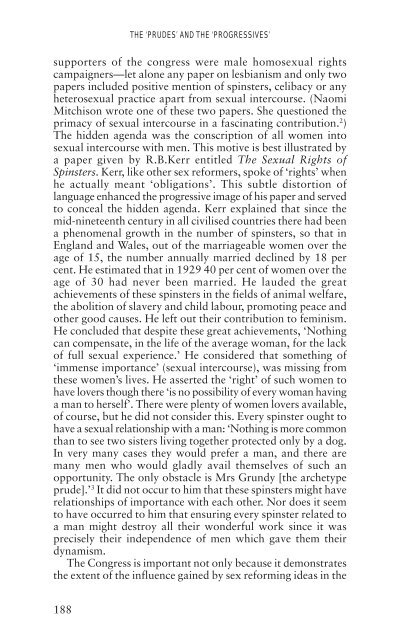The Spinster and Her Enemies - Feminish
The Spinster and Her Enemies - Feminish
The Spinster and Her Enemies - Feminish
You also want an ePaper? Increase the reach of your titles
YUMPU automatically turns print PDFs into web optimized ePapers that Google loves.
THE ‘PRUDES’ AND THE ‘PROGRESSIVES’<br />
supporters of the congress were male homosexual rights<br />
campaigners—let alone any paper on lesbianism <strong>and</strong> only two<br />
papers included positive mention of spinsters, celibacy or any<br />
heterosexual practice apart from sexual intercourse. (Naomi<br />
Mitchison wrote one of these two papers. She questioned the<br />
primacy of sexual intercourse in a fascinating contribution. 2 )<br />
<strong>The</strong> hidden agenda was the conscription of all women into<br />
sexual intercourse with men. This motive is best illustrated by<br />
a paper given by R.B.Kerr entitled <strong>The</strong> Sexual Rights of<br />
<strong>Spinster</strong>s. Kerr, like other sex reformers, spoke of ‘rights’ when<br />
he actually meant ‘obligations’. This subtle distortion of<br />
language enhanced the progressive image of his paper <strong>and</strong> served<br />
to conceal the hidden agenda. Kerr explained that since the<br />
mid-nineteenth century in all civilised countries there had been<br />
a phenomenal growth in the number of spinsters, so that in<br />
Engl<strong>and</strong> <strong>and</strong> Wales, out of the marriageable women over the<br />
age of 15, the number annually married declined by 18 per<br />
cent. He estimated that in 1929 40 per cent of women over the<br />
age of 30 had never been married. He lauded the great<br />
achievements of these spinsters in the fields of animal welfare,<br />
the abolition of slavery <strong>and</strong> child labour, promoting peace <strong>and</strong><br />
other good causes. He left out their contribution to feminism.<br />
He concluded that despite these great achievements, ‘Nothing<br />
can compensate, in the life of the average woman, for the lack<br />
of full sexual experience.’ He considered that something of<br />
‘immense importance’ (sexual intercourse), was missing from<br />
these women’s lives. He asserted the ‘right’ of such women to<br />
have lovers though there ‘is no possibility of every woman having<br />
a man to herself’. <strong>The</strong>re were plenty of women lovers available,<br />
of course, but he did not consider this. Every spinster ought to<br />
have a sexual relationship with a man: ‘Nothing is more common<br />
than to see two sisters living together protected only by a dog.<br />
In very many cases they would prefer a man, <strong>and</strong> there are<br />
many men who would gladly avail themselves of such an<br />
opportunity. <strong>The</strong> only obstacle is Mrs Grundy [the archetype<br />
prude].’ 3 It did not occur to him that these spinsters might have<br />
relationships of importance with each other. Nor does it seem<br />
to have occurred to him that ensuring every spinster related to<br />
a man might destroy all their wonderful work since it was<br />
precisely their independence of men which gave them their<br />
dynamism.<br />
<strong>The</strong> Congress is important not only because it demonstrates<br />
the extent of the influence gained by sex reforming ideas in the<br />
188

















